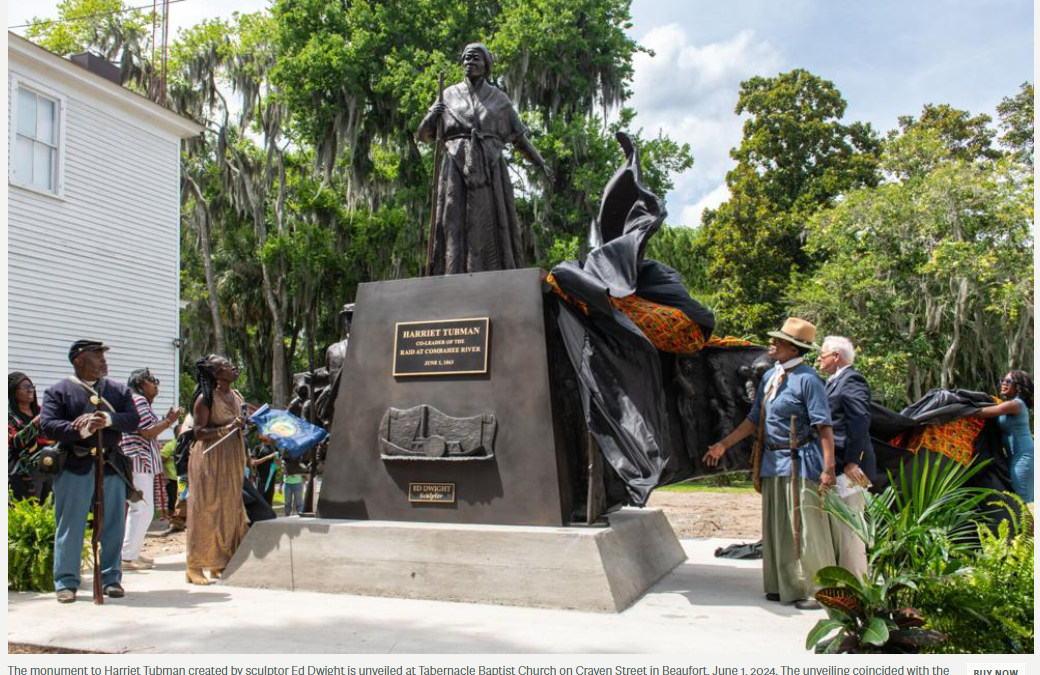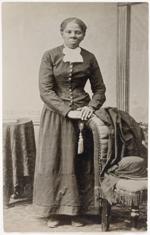The National Parks Service has reversed course and restored references of celebrated abolitionist Harriet Tubman to its webpage about the Underground Railroad.
A quote and image of the legendary freedom fighter — who also served a pivotal role in Beaufort County and the S.C. Lowcountry during the Civil War — that led the park service’s Underground Railroad webpage disappeared recently during an effort to scrub federal websites of certain content. Both Tubman’s image and words were removed from the NPS page along with multiple references to enslaved people and the Fugitive Slave Act of 1850, the Washington Post first reported using the internet archive Wayback Machine.
In Tubman’s place, commemorative stamps were places of various Black and White civil rights leaders with text including the phrases “Black/White Cooperation,” “Flight/Faith” and “Courage/Risk.” The introduction with that change also did not include mentions of slavery, which had been restored as of April 8 along with Tubman’s image and quote.
“I was the conductor of the Underground Railroad for eight years, and I can say what most conductors can’t say — I never ran my train off the track and I never lost a passenger,” it reads.
The Underground Railroad was a series of routes taken by enslaved people on the run to freedom in the North. Help along the Underground Railroad came from diverse groups, including White abolitionists.
In a statement to CNN, a National Park Service spokesperson said the changes were made without approval from department leadership.
The Trump administration has tried to “muzzle the Park Service,” said Alan Spears, National Parks Conservation Association senior director of cultural resources.
“We join history advocates across the political spectrum in urging the administration to stop this unprecedented unraveling of our nation’s heritage,” Spears said in a written statement. “The American people deserve nothing less than the truth about our history. We will not settle for smoke and mirrors.”
The references to Tubman were the latest rewrite in the Trump administration’s mass removal of content from government websites. In February, the administration ordered the Pentagon to purge website postings, photos, news articles and videos with any mentions that “promote diversity, equity and inclusion.”
A similar incident happened in March, when two websites dedicated to Black veterans — including baseball star Jackie Robinson and Medal of Honor recipient Army Maj. Gen. Charles Gavin Rogers — were taken offline before being restored.
Kingstree native and retired National Park Service professional Michael Allen has kept tabs on the revisions with unease.
“I believe this puts us on a dangerous pathway to sanitize and erase history,” Allen said. “And I think there are repercussion to that.”
Allen worked nearly 38 years with the National Park Service and helped to develop the Gullah Geechee Cultural Heritage Corridor and the Reconstruction Era National Monument in Beaufort.
“We do and have made mistakes as a nation,” Allen said. “Yes, we do have blood on our hands, but I think museums and buildings within the National Park Service have a place to deal with this, interpret this and present it.”
Tubman’s ties to S.C.
Tubman’s legacy runs deep in the Lowcountry.
A legendary abolitionist, Tubman escaped slavery and dedicated her life to helping others find freedom. She became a pivotal conductor on the Underground Railroad — a network of sites and places stretching from the Deep South to the North where enslaved people could hide along secret routes as they made their way to freedom.
From the spring of 1862 for about two years, Tubman lived in Beaufort and helped fugitive slaves who sought safety and refuge in Port Royal, which was then controlled by Union forces. She also aided ailing soldiers as a nurse, started bakery and laundry operations, and criticized President Abraham Lincoln when he resisted allowing Black people to serve in the Army.
In 1863, her leadership in the Combahee River Raid helped to liberate more than 750 people. Many of those freed men and women found sanctuary on the north end of Hilton Head Island, in a community that became known as Mitchelville.
Mitchelville was the first self-governed town of formerly enslaved people and, at one time, was the economic and cultural hub of the island. Established in 1862, the community’s success served as proof of concept for the Port Royal Experiment, which sought to create schools and hospitals for the formerly enslaved, as well as to enable them to buy land seized from slaveholders.
On Veteran’s Day in November 2024, Tubman was posthumously awarded the rank of brigadier general in the Maryland National Guard for her role in the gunboat raid in the S.C. Lowcountry, as well as her roles as a scout, spy and nurse for the Union Army during the Civil War.
–postandcourier.com




